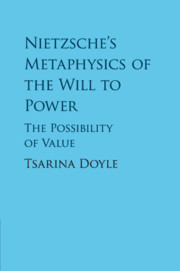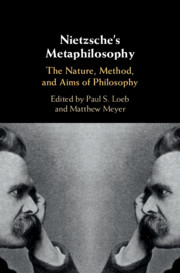Nietzsche's Metaphysics of the Will to Power
Nietzsche's controversial will to power thesis is convincingly rehabilitated in this compelling book. Tsarina Doyle presents a fresh interpretation of his account of nature and value, which sees him defy the dominant conception of nature in the Enlightenment and overturn Hume's distinction between facts and values. Doyle argues that Nietzsche challenges Hume indirectly through critical engagement with Kant's idealism, and that in so doing and despite some wrong turns, he establishes the possibility of objective value in response to nihilism and the causal efficacy of consciousness as a necessary condition of human autonomy. Her book will be important for scholars of Nietzsche's metaphysics, and of the history of philosophy and science more generally.
- Presents a fresh perspective on a controversial aspect of Nietzsche's philosophy, showing how it contributes to debates about naturalism and normativity
- Demonstrates how the will to power thesis provides Nietzsche with the necessary conceptual and metaphysical resources to address the problem of nihilism
- Engages with the influence of Kant and Hume on Nietzsche's account of nature and value
Reviews & endorsements
‘With clarity, verve, and philosophical sophistication, Tsarina Doyle shows that at the core of Nietzsche's thought stands the project of a naturalistic metaphysics. Nietzsche's value pluralism and his conception of a ‘will to power' are rooted in the claim that mind, values, and norms are continuous with, yet irreducible to, the natural world. As such, Nietzsche's naturalistic metaphysics combines central features of Hume's radical naturalism and Kant's transcendental idealism. Drawing on both the history of philosophy and current arguments about nature and normativity, Doyle's book is a major achievement that, once again, highlights Nietzsche's continued relevance to current philosophical debates.' Christian Emden, Rice University, Texas
Product details
January 2020Paperback
9781108404860
250 pages
230 × 150 × 12 mm
0.35kg
Available
Table of Contents
- Introduction: structure of the argument
- Nietzsche and Naturalism
- 1. Nihilism and the Problem of Objective Value: The Kantian Roots to Nietzsche's Fictionalism: The Priority of Art over Science
- The Second Argument for Value Fictionalism: The Priority of Science over Art
- Non-Cognitivism and Phenomenal Objectivity
- 2. Value and Objectivity: Value Objectivism
- Comprehensive Science
- 3. The Will to Power as a Response to Kant: Nietzsche's Qualified Praise for Kant's Idealism
- The Will to Power as an Alternative to Kant's Synthesis
- A Textual and Philosophical Challenge
- 4. Value and the Will to Power: Nietzsche's Dispositional Account of Value
- Anti-Projectionism
- Dispositions and Normativity
- 5. The Capacities of the Conscious Mind: The Leibnizean and Kantian background to Nietzsche's Account of the Conscious Mind
- Reconstruction of Nietzsche's Argument
- The Ubiquity of the Intentional
- Conclusion.





